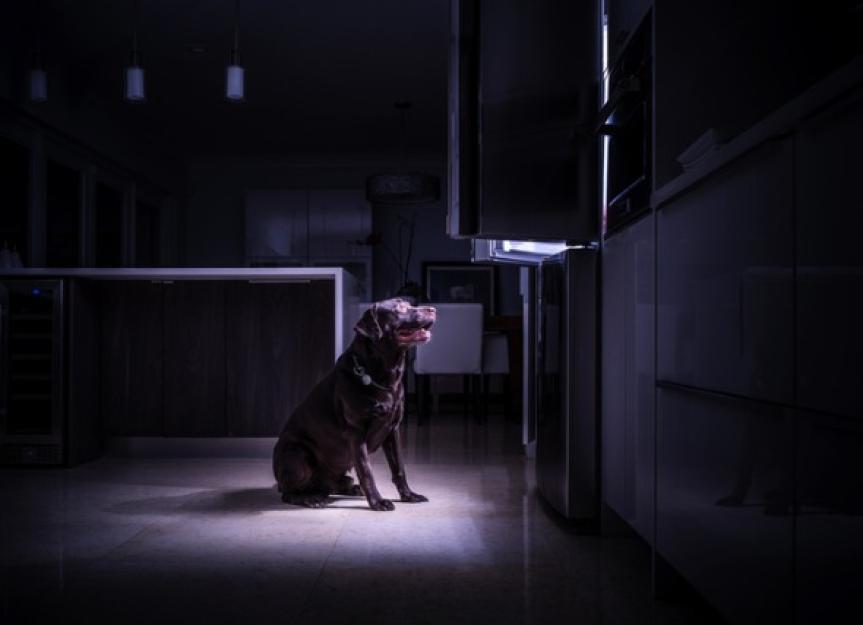When it comes to the question of whether or not Dobermans can see at night, the answer might surprise you. While their night vision abilities might not rival those of nocturnal animals, Dobermans do have a certain level of vision in low light conditions.
Historically bred for their fearlessness and agility, Dobermans possess several adaptations that enhance their vision, including a high concentration of rod cells in their retinas. These cells are responsible for detecting light and movement, making Dobermans more adept at seeing in dimly lit environments. While they may not possess the same level of visual acuity as some other animals, Dobermans can still navigate and identify objects in darkness to a certain extent.
Doberman Pinschers have excellent night vision due to their exceptional eyesight. They possess a larger number of rod cells in their retinas, which enables them to see well in low light conditions. Additionally, their large, almond-shaped eyes enhance their peripheral and depth perception. This superior vision allows Dobermans to navigate and detect objects in the dark with ease.

Can Dobermans See at Night?
Dobermans are known for their alertness and keen senses. One common question that arises is whether they can see at night. In this article, we will explore the night vision capabilities of Dobermans and shed some light on this intriguing topic.
Understanding Doberman Vision
Dobermans, like most dogs, possess a visual system that differs from human vision. While humans have better color vision and a greater capacity to see details during daylight, dogs have superior night vision and the ability to detect movement more effectively.
Dobermans have a structure in their eyes called the tapetum lucidum, which enhances their night vision. This structure reflects light within the eye, effectively giving the retinal cells a second chance to detect it. As a result, they can see better in low light conditions compared to humans.
However, it’s important to note that while Dobermans have better night vision than humans, their vision in complete darkness is still limited. They rely on other senses, such as hearing and smell, to navigate their surroundings in such conditions.
Factors Affecting Night Vision in Dobermans
The night vision capabilities of Dobermans can be influenced by various factors. These factors include:
- Age: Like humans, dogs experience age-related changes in vision. Older Dobermans may not have the same level of night vision as younger ones.
- Health: Any underlying eye conditions or diseases can affect a Doberman’s night vision.
- Training: Dogs that have undergone specific training to enhance their night vision abilities may exhibit superior performance in low light conditions.
Caring for Doberman’s Vision
To ensure optimal vision health in Dobermans, it is essential to take certain preventive measures:
- Regular Veterinary Check-ups: Schedule regular appointments with a veterinarian to monitor your Doberman’s eye health and address any concerns promptly.
- Diet and Nutrition: Provide your Doberman with a well-balanced diet that includes essential vitamins and minerals for overall eye health.
- Protective Eyewear: If your Doberman is regularly exposed to bright sunlight or potential eye hazards, consider using protective eyewear designed specifically for dogs.
Can Dobermans See Clearly in the Dark?
While Dobermans have better night vision than humans, their ability to see clearly in the dark is limited. In complete darkness, they rely on their other senses and the faint light available to make out their surroundings. However, their visual acuity is not as sharp as it is during the day or in well-lit areas.
It’s essential to provide adequate lighting for your Doberman if they need to move around during nighttime hours. This can help prevent accidents and ensure their safety.
Can Dobermans See at Night? – Key Takeaways
- Dobermans have excellent night vision due to their unique eye structure.
- They have larger pupils and more light-sensitive cells in their retinas, allowing them to see in low light conditions.
- Dobermans also have a reflective layer behind their retina called the tapetum lucidum, which enhances their night vision.
- Their keen senses, including their sharp hearing and sense of smell, further aid them in navigating in the dark.
- While Dobermans can see well at night, it’s important to provide them with adequate lighting in their surroundings for safety purposes.
Frequently Asked Questions
Here are some commonly asked questions about a Doberman’s ability to see at night.
1. Can Dobermans see in the dark?
Dobermans have excellent night vision compared to humans. Their eyes are equipped with a higher number of rod cells, which are responsible for vision in low light conditions. This allows them to see in the dark, although their vision is not as sharp as it is during daylight.
Additionally, Dobermans have other sensory adaptations that aid their night vision, such as an enhanced sense of smell and hearing. These abilities, combined with their natural instinct to be alert and vigilant, make Dobermans well-suited for seeing in low light conditions.
2. How do Dobermans see better in the dark than humans?
Dobermans have a larger tapetum lucidum, a reflective layer behind the retina that enhances their ability to capture and reflect light. This allows their eyes to gather more available light, improving their night vision. In contrast, humans have a smaller tapetum lucidum, which limits our ability to see in low light environments.
Additionally, Dobermans have a wider field of view than humans, which helps them detect movements and objects in their peripheral vision, even in dimly lit environments. These visual adaptations give Dobermans an advantage when it comes to seeing in the dark.
3. Are Dobermans completely nocturnal?
No, Dobermans are not completely nocturnal. While they have superior night vision compared to humans and can see relatively well in low light conditions, they are diurnal animals, meaning they are most active during the day. However, their excellent night vision allows them to navigate and protect their surroundings during the darker hours.
It’s important to note that a Doberman’s activity level and behavior can vary based on factors such as training, socialization, and individual preferences. Some Dobermans may be more active during the night, while others may be more active during the day.
4. Do Dobermans need extra lighting at night?
In most cases, Dobermans do not require extra lighting at night. Their natural night vision abilities, combined with their acute senses and alertness, allow them to navigate and function well in low light conditions. However, providing some ambient lighting in areas where they spend time can be beneficial, especially for older or visually impaired Dobermans.
It’s important to create a safe and well-lit environment for your Doberman to prevent accidents and ensure their comfort. This can include using night lights or strategically placing lights in areas such as hallways and stairs to assist their navigation.
5. Can a Doberman’s night vision be improved?
A Doberman’s night vision cannot be significantly improved beyond its natural abilities. They are already well-adapted for seeing in low light conditions. However, maintaining their overall eye health through regular veterinary check-ups and providing them with a balanced diet rich in essential nutrients can support their visual function.
Additionally, ensuring a Doberman’s living environment is free from hazards and providing them with a well-lit area to rest and sleep can contribute to their overall comfort and well-being.

The First Night Home with Your Doberman Puppy
In summary, Dobermans have excellent vision, but their ability to see at night is limited.
Their vision is more suited for daylight and they rely on their other senses, such as hearing and smell, in low-light conditions.
